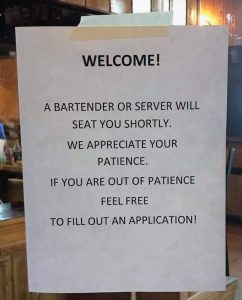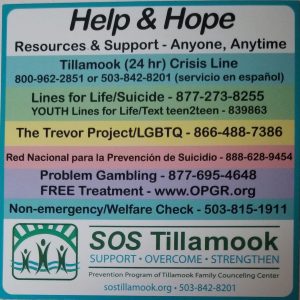
By Dan Haag
The barista’s eyes were hollow as she handed me my order.
“Have a nice day,” she said, her gaze tracking to the growing, restless line behind me.
“How are you doing?” I asked softly.
“I’m in a living nightmare,” she replied, shaking her head and gesturing at the “Face Mask Required” sign on the counter. “I don’t think this will ever end.”
Despite wearing a mask, I offered her a smile and tried to think of something to say to cheer her up. Instead, I nodded and left. I’ve had a variation of this same conversation with nearly everyone I come know over the last year-and-a-half. There was a jubilant spike of enthusiasm in June when it seemed we were on our way back to normalcy. Now, the recent surge of the Delta variant has crushed much of that optimism like a boot on an empty pop can. We rightfully focus on masking, social distancing and vaccines, but what about our mental health?
Recently, I stood in front of the mirror and wondered who the person was looking back at me. He looked vaguely familiar, like someone I used to know but couldn’t quite place. An inventory of the reflection told the story of the past 18 months: 15 pounds overweight, dark circles under my eyes, a painful stoop to my shoulders, and a permanent furrowed brow. My brown hair is rapidly thinning and giving way to white while the hair in my nose and ears gleefully sprouts like tentacles. The culprits for this transformation lurk just beneath the surface: high blood pressure, a perpetually queasy stomach, raging insomnia and acute irritability. I was confused. Who was this guy? In a display of mature defiance, I flipped my overweight, balding doppelganger the bird, turned off the light and went to bed where I hoped to get a least two solid hours of sleep. Instead, I lay there in the dark, wide awake and agonizing over what the world might look like in the morning.
 The last year and a half has been rough on the mind, body, and spirit. I’ve let stress move in, remodel, and build an addition. I’ll spare you the details but in my darker moments – and there have been many – I can’t see a light at the end of the tunnel, just an endless loop of Zoom meetings, alarming emails, and screaming headlines. It is indeed a “waking nightmare.” A few weeks ago, I asked a friend how he was holding up and his answer was telling: “Everyone keeps saying ‘we’re all in this together.’ It’s weird, because I’ve never felt more alone in my life.”
The last year and a half has been rough on the mind, body, and spirit. I’ve let stress move in, remodel, and build an addition. I’ll spare you the details but in my darker moments – and there have been many – I can’t see a light at the end of the tunnel, just an endless loop of Zoom meetings, alarming emails, and screaming headlines. It is indeed a “waking nightmare.” A few weeks ago, I asked a friend how he was holding up and his answer was telling: “Everyone keeps saying ‘we’re all in this together.’ It’s weird, because I’ve never felt more alone in my life.”
 It’s been especially hard on empathetic people who deeply feel the suffering of others. Just look around our area. People are struggling every day to make ends meet while navigating work, family, and a deadly pandemic where the rules seem to change hourly. Those who work with the public these days are the subject of people’s displeasure over face masks and other restrictions. I hear stories about vacationers yelling at waitstaff over wait times for food and it breaks my heart. Additionally, there is the constant screech of social media where you can get into a heated argument about everything from politics to vaccines to the color of the sky. And above it all is the rapidly rising toll of fellow Americans who have died, 600,000-plus and counting. It’s a lot for a soul to absorb on a daily basis, especially when it always feels like another shoe is about to drop.
It’s been especially hard on empathetic people who deeply feel the suffering of others. Just look around our area. People are struggling every day to make ends meet while navigating work, family, and a deadly pandemic where the rules seem to change hourly. Those who work with the public these days are the subject of people’s displeasure over face masks and other restrictions. I hear stories about vacationers yelling at waitstaff over wait times for food and it breaks my heart. Additionally, there is the constant screech of social media where you can get into a heated argument about everything from politics to vaccines to the color of the sky. And above it all is the rapidly rising toll of fellow Americans who have died, 600,000-plus and counting. It’s a lot for a soul to absorb on a daily basis, especially when it always feels like another shoe is about to drop.
So what do we do? According to numerous television commercials, prescription drugs are an option. You know the ones I mean: smiling, happy people walking in slow motion, calmly folding laundry, and staring dreamily into the distance while the narrator lists the multiple side effects that may or may not cause you to bleed from your eyeballs or make your big toe fall off. Personally, I’ve never been much of a prescription drug person and the thought of taking a pill that causes something called “anal leakage” holds very little appeal to me.
It can be hard to ask for help, especially when we want to be strong for others. When my friend spoke of never feeling so alone, I was confused at first. I pointed out that he is happily married and is surrounded by kids and grand kids. “They’re going through the same thing, they don’t need to hear my problems,” he said. I realized that I had been guilty of the same thing in my household. Because we are all embroiled in the same pandemic, there’s the fear of unburdening yourself to a wife or husband or parents at their expense. Truthfully, by balling up our feelings and hiding them from your loved ones we are squandering our most valuable resource and risk alienating those who care for us the most.
Meeting that man in the mirror was a wake up call. Pandemic or not, I’ve realized that it’s time to help myself. It’s time to stop pretending I’m peachy, especially when there is still such a long road to travel until we reach the end of this. I can’t be a scowling, stooped, seething ball of nerves who flinches every time he opens his email or turns on the news. It’s unsustainable.
I’m not sharing all of this with you to garner sympathy, though if you are so inclined I rarely turn down free beer. What I want more than anything is to let you know you’re not alone. It’s OK to admit that you’re not OK. Don’t be afraid to ask for help. Let someone lighten your load and in that way, we truly will all be in this together.

Looking for help related to Covid-19 stress? Here are several area options:
– If you or someone you know is in crisis, there is a 24-hour crisis line in Tillamook County at 800-962-2851 or 503-842-8201
– SOS Tillamook lists help lines – http://www.sostillamook.org/
– The Tillamook YMCA is manning a “COVID Cares” phone line – (503) 374-0750
– Check out the Tillamook County Wellness Connect Well – https://tillamookcountywellness.org/connect-well/
– The Rinehart Clinic has Counselors & Behavioral Health clinicians who could address any COVID related mental health issue, 800-368-5182
– Tillamook Community Health Centers https://tillamookchc.org/behavioral-health/ or 503-842-3938
– If you want someone to talk to, the David Romprey Oregon Warmline is available every day from 9 a.m. to 11 p.m. at 1-800-698-2392.
– You can also call the Safe + Strong Helpline at 800-923-4357 (800-923-HELP). The line offers free, 24-7 emotional support and resource referral to anyone who needs it. More resources are available on the Safe + Strong mental and emotional health page – https://www.safestrongoregon.org/
Thank You to Linda Kuestner, Velda Handler, Kate Grimm and Margaret Steele at EVCNB and Michelle Jenck at Adventist Health for supplying the list of local resources.


